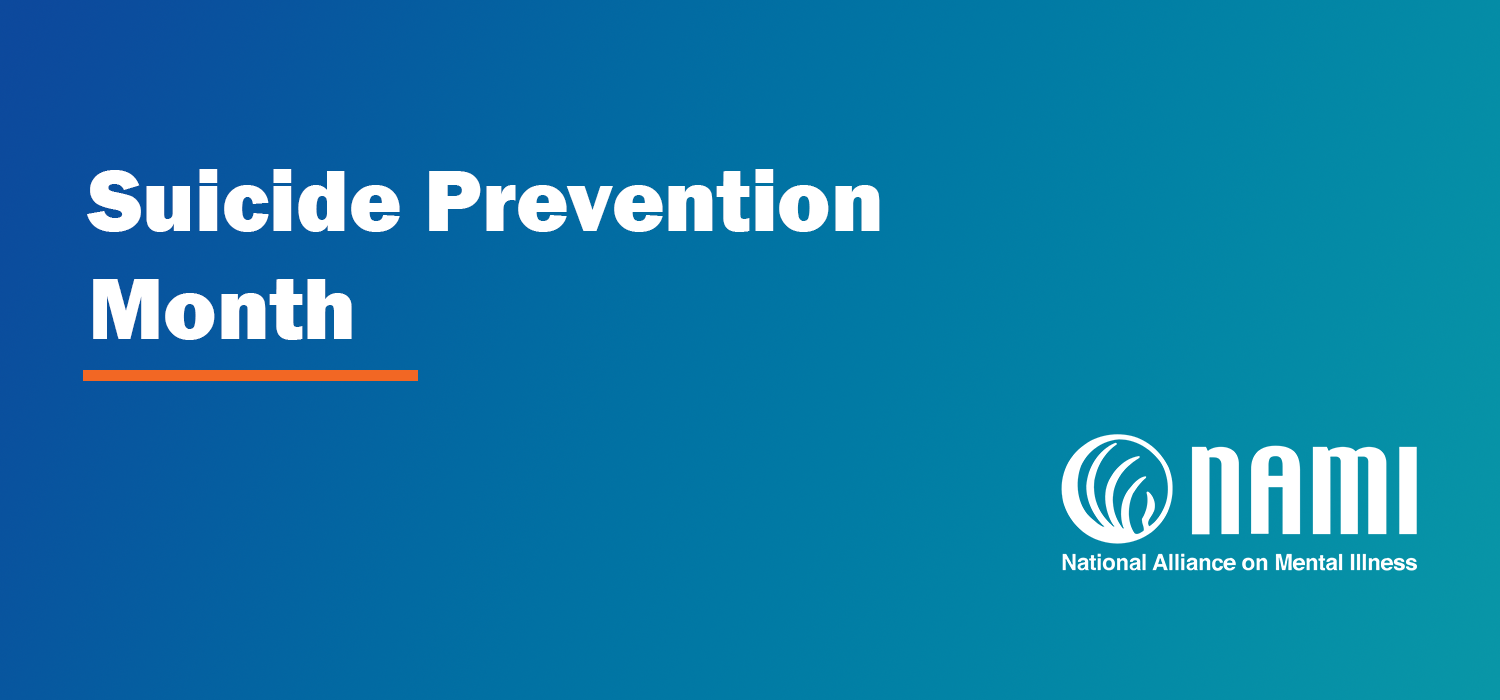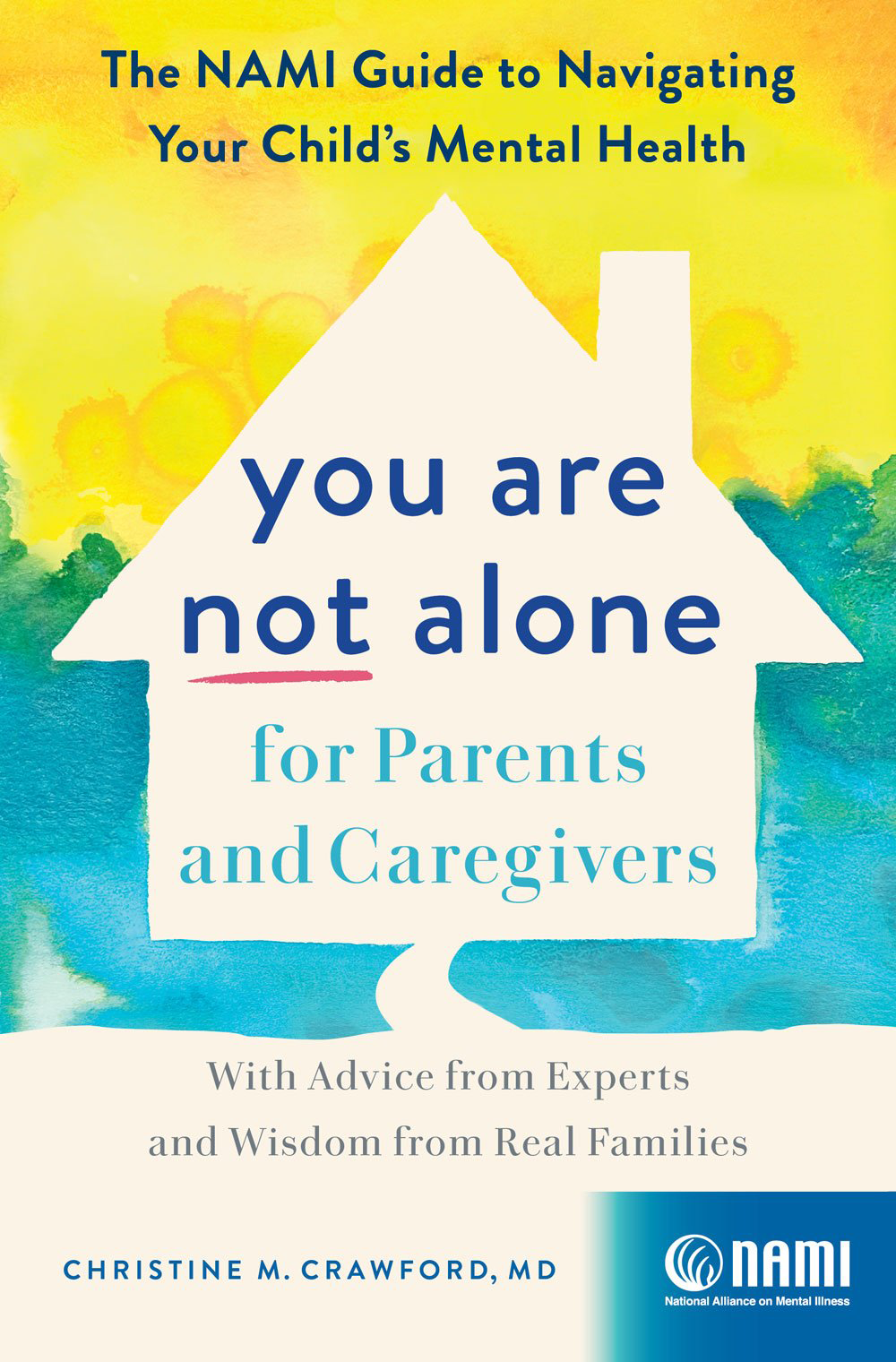Suicide Prevention Month (original) (raw)
If you or someone you know is struggling or in crisis, help is available. Call or text 988 or chat 988lifeline.org to reach the 988 Suicide & Crisis Lifeline.

Suicidal thoughts, much like mental health conditions, can affect anyone regardless of age, gender or background. Suicidal thoughts, although common, should not be considered normal and often indicate more serious issues.
September is Suicide Prevention Month — a time to raise awareness of this urgently important crisis. We use this month to shift public perception, spread hope and share vital information to people affected by suicide. Our goal is ensuring that individuals, friends and families have access to the resources they need to discuss suicide prevention and to seek help.
Jump To:
- Crisis Resources
- Download the Toolkit
- Join the Conversation
- Advocate
- Order "You Are Not Alone for Parents and Caregivers"
- Share Key Fast Facts
Download the Toolkit
We at NAMI have created this toolkit to support NAMI State Organizations and Affiliates, partners and ambassadors, and other mental health champions in an effort to promote Suicide Prevention Month. We encourage you to use these resources in your own promotion and awareness efforts.
Join us in shifting the mental health culture through conversation. Download our toolkit for more insights and resources on how to spread awareness.
Join the Conversation
Throughout September, we invite you to share our messages below or your own about Suicide Prevention Month through the power of courageous community conversations. Help us amplify the message that there is strength in vulnerability.
Don’t forget to tag us at @NAMICommunicate on Instagram and X (formerly Twitter) and @NAMI on TikTok, LinkedIn, and Facebook. And be sure to use the hashtag #SuicidePreventionMonth in your posts.
In every post, please add language or a reply comment providing information to 988. This can include but is not limited to:
Sample Social Media Captions
- If you or someone you know has thoughts of suicide, immediate help is available. Call, text, or chat 988 to speak to a trained crisis counselor offering support 24/7/365. #SuicidePreventionMonth
- As we share our mental health journeys – the good, the bad, and the ugly – we begin to let down our walls and create safe spaces. Join me in fostering open conversations. #SuicidePreventionMonth
- Let’s create spaces where people can prioritize their mental health, where their voices are heard, where support thrives and flows freely, and where healing can take root. #SuicidePreventionMonth
- It’s #SuicidePreventionMonth – if you are struggling, there are options available to help. Call or text #988, or chat at 988lifeline.org, to speak to someone and get immediate support.
- #SuicidePreventionMonth provides a dedicated time to come together with passion and strength to address this difficult topic. We can all benefit from honest conversations about mental health and suicide, because just one conversation can change a life.
- Starting a conversation can help save a life. Studies show people who are having thoughts of suicide feel relief when someone asks about them in a caring way. Learn more about how to help support someone you care about through a crisis at nami.org/suicidepreventionmonth.
We encourage you to incorporate these graphics in your social media posts, cover images, website hero images, or existing messaging to help spread awareness during September. High-quality files can be downloaded at the link here.
While suicide prevention is important to address year-round, Suicide Prevention Month provides a dedicated time to come together with collective passion and strength to address this difficult topic. The truth is, we can all benefit from honest conversations about mental health conditions and suicide, because just one conversation can change a life.
Advocate
Order "You Are Not Alone for Parents and Caregivers"
 In “You Are Not Alone for Parents and Caregivers,” child psychiatrist and NAMI’s Associate Medical Director Dr. Christine M. Crawford provides a comprehensive, compassionate, and practical resource for anyone concerned about a child’s mental health. Drawing on her own clinical experience and guidance from leading experts, Dr. Crawford provides a lens through which to understand the many complex factors affecting children’s mental health. Analyzing young people from preschool to high school, she shares insights into how mental health conditions may manifest at different ages, what kind of interventions may be necessary, and what to do to help kids thrive. Throughout, the book channels the collective wisdom of the NAMI community. Parents, caregivers, and young people themselves share personal stories about their paths to recovery, ensuring readers know that they are not alone.
In “You Are Not Alone for Parents and Caregivers,” child psychiatrist and NAMI’s Associate Medical Director Dr. Christine M. Crawford provides a comprehensive, compassionate, and practical resource for anyone concerned about a child’s mental health. Drawing on her own clinical experience and guidance from leading experts, Dr. Crawford provides a lens through which to understand the many complex factors affecting children’s mental health. Analyzing young people from preschool to high school, she shares insights into how mental health conditions may manifest at different ages, what kind of interventions may be necessary, and what to do to help kids thrive. Throughout, the book channels the collective wisdom of the NAMI community. Parents, caregivers, and young people themselves share personal stories about their paths to recovery, ensuring readers know that they are not alone.
Order the book via: Amazon, Target, Barnes & Noble, Books-A-Million, and Bookshop.org.
Share Key Fast Facts
Please feel free to use these facts and others, to encourage discussions with your community through social media or other forms of outreach.
Individual Impact:
- 79% of all people who die by suicide are male.
- Although more women than men attempt suicide, men are 4x more likely to die by suicide.
- Suicide is the 2nd leading cause of death among people aged 10-14, the 3rd leading cause of death among those aged 15-24 and the 12th leading cause of death overall in the U.S.
- 46% of people who die by suicide had a diagnosed mental health condition — but research suggests that 90% may have experienced symptoms of a mental health condition.
Community Impact:
- Annual prevalence of serious thoughts of suicide, by U.S. demographic group:
- U.S. Adults: 4.8%
- Native Hawaiian/other Pacific Islander: 7.4%
- Mixed/Multiracial: 8.2%
- American Indian/Alaska Native: 8.5%
- Young adults aged 18-25: 13%
- High school students: 22%
- LGBTQ youth: 41%
- The highest rates of suicide in the U.S. are among American Indian/Alaskan Natives, followed bynon-Hispanic white people.
- Lesbian, gay and bisexual youth are 4x more likely to attempt suicide than straight youth.
- Transgender adults are nearly 9x more likely to attempt suicide at some point in their life compared to their peers.
- Suicide is the leading cause of death for people held in local jails.
Data from CDC, NIMH and other select sources.
Find Your Local NAMI
NAMI HelpLine is available M-F, 10 a.m. – 10 p.m. ET. Call 800-950-6264,
text “helpline” to 62640, or chat online. In a crisis, call or text 988 (24/7).
